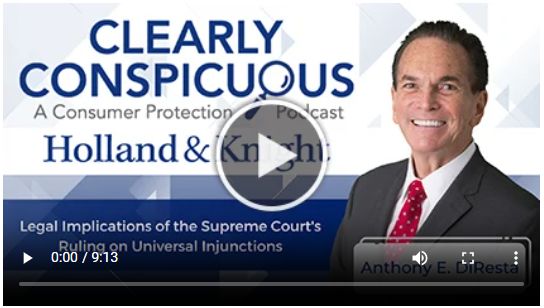- in European Union
In this episode of "Clearly Conspicuous," consumer protection attorney Anthony DiResta discusses the recent U.S. Supreme Court decision in Trump v. CASA, Inc., where the court ruled federal district courts generally cannot issue universal injunctions under the Judiciary Act of 1789. The decision, delivered on June 27, 2025, means that district courts can grant injunctions that provide relief only to plaintiffs with standing, not to those who are not parties to the case. Mr. DiResta examines possible significant implications for businesses and individuals subject to federal statutes or executive actions, as well as the other avenues that remain available for obtaining broad relief.
Podcast Transcript
Welcome to another podcast of Clearly Conspicuous. As we noted in previous sessions, our goal in these sessions is to make you succeed in this current environment, make you aware of what's going on with the federal and state consumer protection agencies and give you practical tips for success. It's a privilege to be with you today.
Today's session is going to be somewhat different because today we are going to discuss the recent Supreme Court decision prohibiting universal injunctions.
On June 27, the Supreme Court held in a 6-3 decision in Trump v. CASA, Inc. that federal courts lack the authority to issue universal injunctions under the Judiciary Act of 1789. In so ruling, the court granted the government's applications to partially stay the preliminary injunctions prohibiting it from enforcing President Trump's Executive Order No. 14160, which seeks to abrogate birthright citizenship. The opinion has implications for companies subject to federal statutes and executive actions, especially those who are not parties to litigation but are currently covered by a universal injunction.
Background on Trump v. CASA, Inc. and Overview of the Supreme Court's Decision
Here's the background. The action involves the government's application for a partial stay of three district courts' preliminary injunctions against implementation and enforcement of Executive Order No. 14160. The order, titled "Protecting the Meaning and Value of American Citizenship," seeks to deny U.S. citizenship to individuals born in the United States whose parents do not meet certain criteria of citizenship or lawful permanent residence. Three district courts independently concluded that the executive order was likely unlawful and entered preliminary injunctions prohibiting its enforcement, not only against the plaintiffs but also against others who are not parties to the cases. The First, Fourth and Ninth Circuits denied applications to stay the injunctions, allowing those injunctions to stand. The government sought a stay pending the appeals and any further review by the court. The court's decision addresses only whether federal courts have the authority to issue such universal injunctions. Because the government did not seek review of the merits, the opinion does not address whether the executive order comports with the Citizenship Clause or the Immigration and Nationality Act. That issue is subject to continued litigation in lower courts.
In terms of the merits of the opinion, Justice Barrett wrote the opinion for the court, which was joined by Chief Justice Roberts and Justices Thomas, Alito, Gorsuch and Kavanaugh. The court emphasized that it addresses only whether federal courts have authority to issue universal injunctions under the Judiciary Act of 1789 and does not address whether such authority is permitted by Article III of the U.S. Constitution.
Under the Judiciary Act of 1789, federal courts have jurisdiction over "all suits ... in equity" and hold the remedial powers accorded to courts of equity at the time of the Founding Fathers, both in England and in the United States. Examining the history, the Court concluded that no "analogous form of relief" as expansive as universal injunctions existed during the founding era. Rather, the court concluded that district courts first started to grant universal injunctions in the 20th century. The absence of universal injunctions in equity practice for most of the nation's history, the court stated, "settles the question of judicial authority."
The majority rejected several of the dissent's arguments. The majority determined that the historical "bills of peace" were more analogous to modern-day class actions, not universal injunctions. The majority determined that the equitable power to provide "complete relief" was confined to the parties to the action and did not extend to nonparties. Finally, the majority rejected the dissent's policy arguments and noted that universal injunctions also carry negative consequences, such as forum shopping and rushed decision-making.
Scope of the Ruling and Next Steps
The court granted applications to partially stay the district courts' universal injunctions "only to the extent that the injunctions are broader than necessary to provide complete relief to each plaintiff with standing to sue." The court also stayed the injunctions to the extent they prohibited executive agencies from preparing public guidance implementing the President's executive order. The lower courts were also instructed to determine the appropriate scope of injunctions that will be afford to different plaintiffs — individuals, states and associations — complete relief in each case.
Concluding Thoughts
So folks, here's the key takeaway: The decision will have an impact for actions challenging federal statutes and executive actions, but several avenues remain available to obtain relief:
- There are Rule 23 Class Actions. Plaintiffs may continue to seek broad preliminary injunctive relief for large — even nationwide — classes under Federal Rule of Civil Procedure 23(b)(2). To certify such a class, however, the plaintiffs must demonstrate numerosity, commonality, typicality and adequacy of the named plaintiffs to represent the class.
- The court noted that "nothing [in its opinion] resolves the distinct question whether the Administrative Procedure Act authorizes federal courts to vacate federal agency action." The APA specifically provides that courts may "set aside" unlawful regulations, for example, as well as stay those regulations from taking effect pending the outcome of the case. Accordingly, plaintiffs may continue to challenge agency action under the APA and obtain the broad relief of vacatur, which by its nature also affords relief to nonparties. Many federal courts have held that Section 706(2) of the Administrative Procedure Act, 5 U.S.C. Section 706(2), [which] instructs courts reviewing agency regulations to vacate regulations that are unlawful as defined by that provision. Vacatur, as the courts understand it, is distinct from injunctions against enforcement proceedings and declaratory judgments. Unlike remedies that operate with respect to parties and parties' rights, vacatur operates on regulations as such, depriving them of legal force. That feature makes vacatur an inherently universal or nationwide remedy.
- State plaintiffs may continue to seek relief for their own injuries, which may inherently result in relief for nonparties, such as the citizens of those states.
So, stay tuned to further programs as we identify and address the key issues and developments, and provide strategies for success. I wish you continued success and a meaningful day. Thank you.
The content of this article is intended to provide a general guide to the subject matter. Specialist advice should be sought about your specific circumstances.


